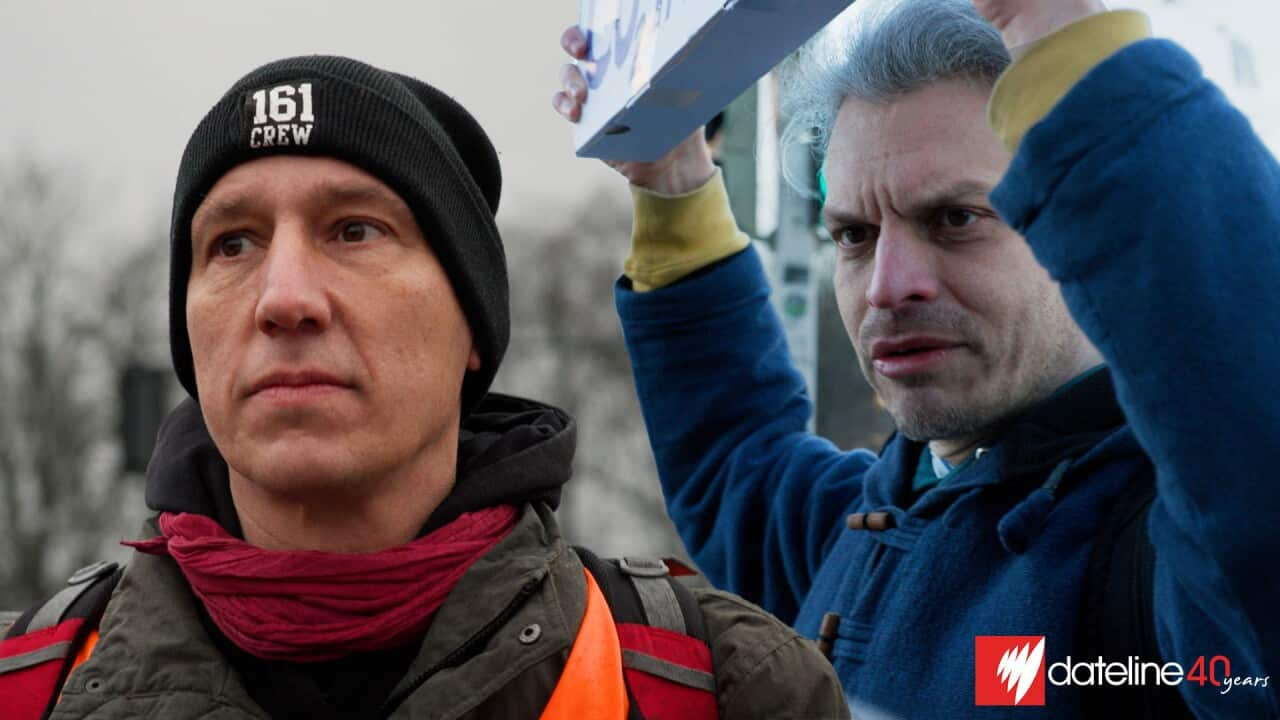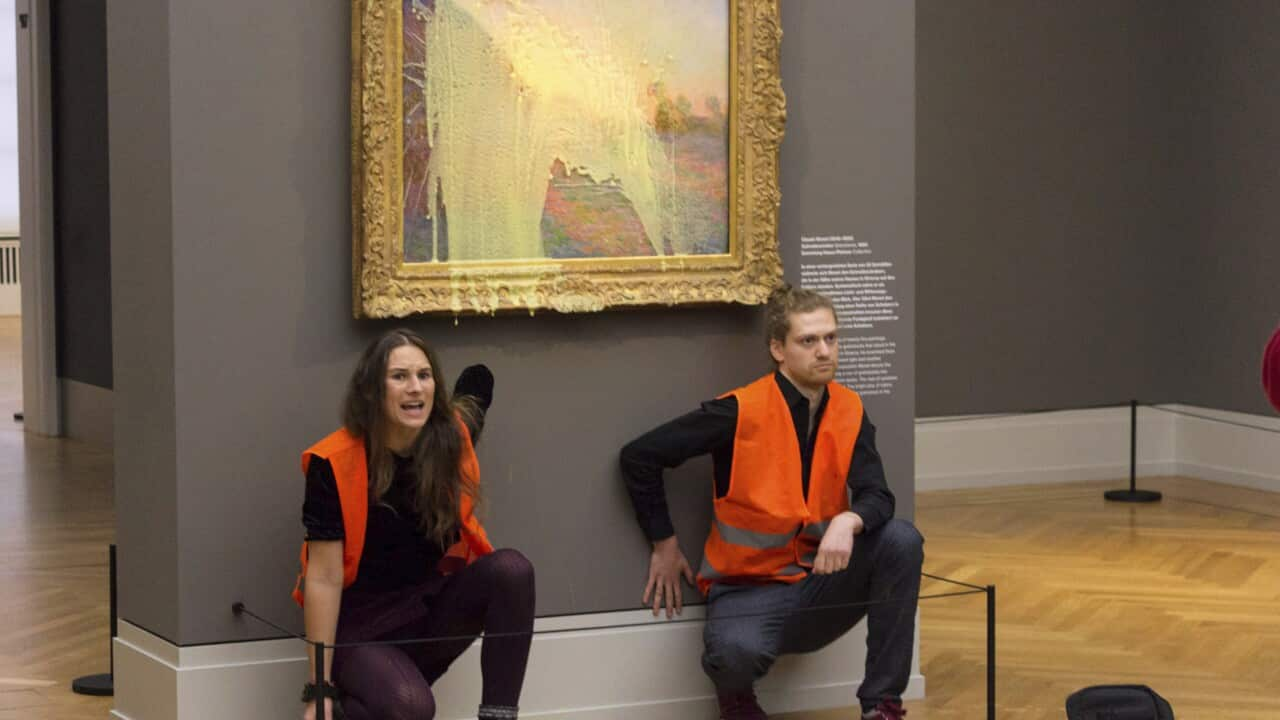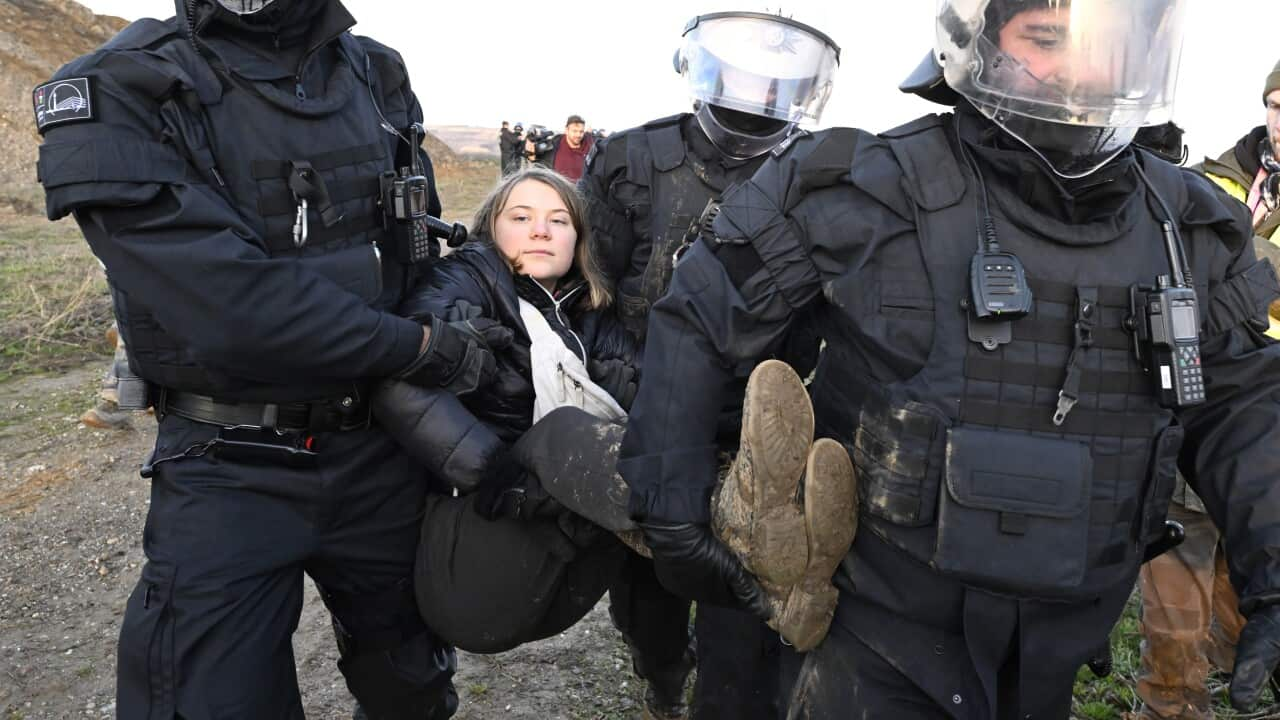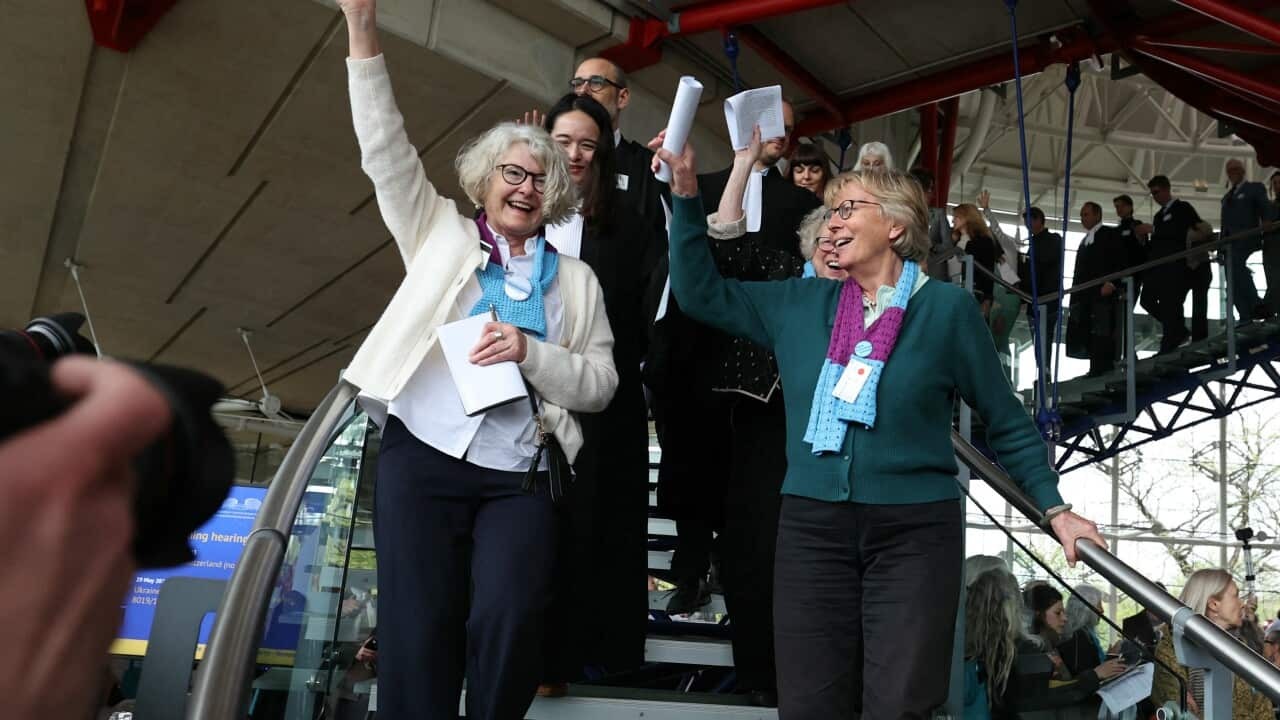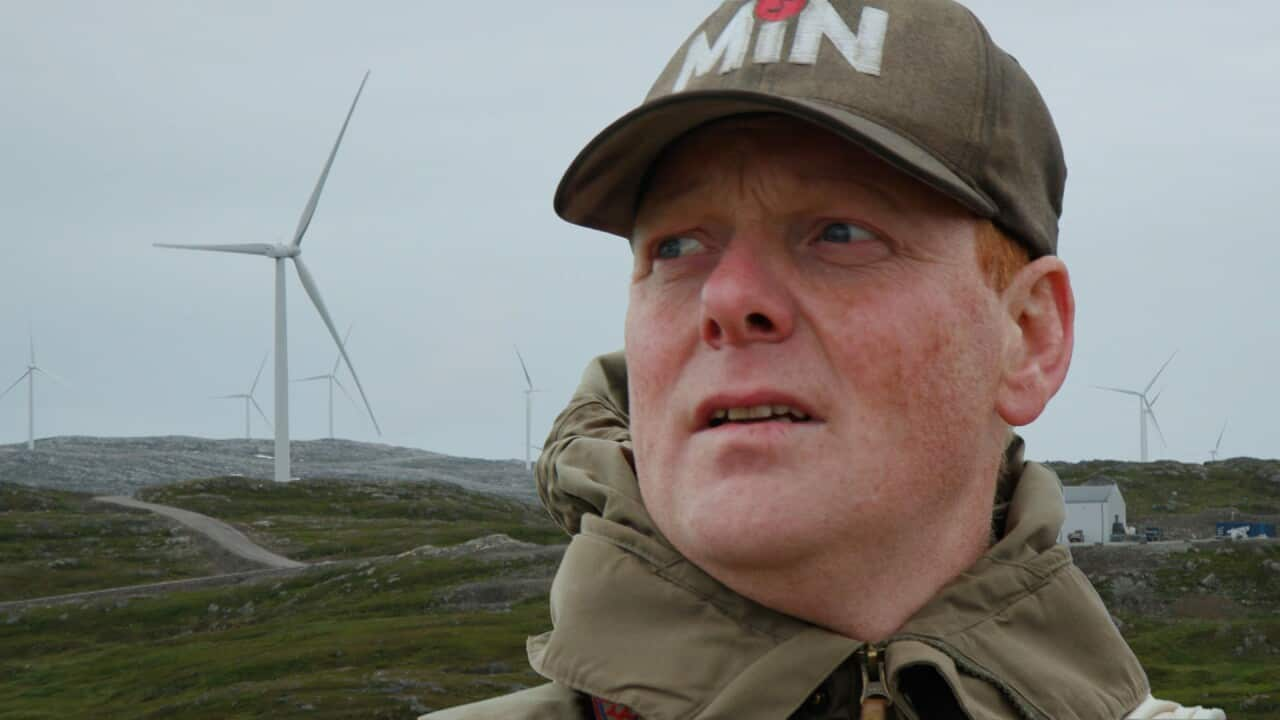Stream free On Demand

Activist Or Extremist?
episode • Dateline • Current Affairs • 28m
episode • Dateline • Current Affairs • 28m
Two men wearing orange and yellow safety vests break into an oil pipeline in the western German state of North Rhine-Westfalia. They turn off the flow by activating the emergency shut-off valve, then chain themselves to it — all in protest against the use of fossil fuels.
The men, Christian Bläul and Wolfgang Metzeler-Kick, are members of a climate activist group called Last Generation, which is now at the centre of a political and legal storm in Germany. The group is facing a state pushback some are calling Orwellian but which the group’s critics say is long overdue.
Having emerged relatively recently, in 2021, Last Generation employs a protest method known as 'direct action' — non-violent disruptive acts aimed at drawing attention to the climate issue.
Members' actions range from blocking streets and disrupting traffic to more radical measures such as and breaking into oil pipelines. To prevent being simply picked up and moved from protest sites by police, they started gluing their hands to roads, walls and other objects, earning the moniker Klima-Kleber, or Climate Gluers.

Last Generation has become known for its non-violent but disruptive actions such as blocking traffic and throwing food on artwork to attract public attention to the climate emergency. Source: SBS / Louis Dai
"I'm willing to go to jail," he told SBS Dateline. "I'm fighting for something that's very, very serious for me."
"It is difficult to convey the message that this is becoming more urgent. (Last Generation) never ever had this idea that we will be popular. The goal was to transport a message about the climate. And if you get hated by the way, then this is fine," he said.
Christian says he has engaged in more than 50 street blockades in an effort to bring attention to climate change.
Metzeler-Kick, a 49-year-old engineer, has been shoulder to shoulder with Christian for many direct-action protests. He, too, says getting public attention is the most important aspect of their activism.
"We are all the last generation before the tipping point, the last generation that can make this tip in the right direction," says Wolfgang, who goes by Wolli. "We are living in a democracy. So how could a government come to make a good decision when the people are not aware of the real depth of the problem?"
Germany, like many developed nations, has made commitments to reduce greenhouse gas emissions. But the war in Ukraine has thrown the country into an energy crisis. The Kremlin cut off gas supplies to the European Union, heavily reliant on Russian gas imports, for its support for Ukraine.
Germany, Europe’s largest economy, had to decide between its climate goals and keeping the lights on – looking for alternative sources and opting to bring some of its shuttered brown coal mines back online. It meant groups like Last Generation ramped up their protests.
For Christian and Wolli, the reasoning was simple: urgent times call for urgent actions. They believe that only through extreme measures can governments be compelled to take immediate and decisive action against climate change. They believe their radical tactics are a reflection of the escalating urgency of the climate crisis – a sentiment echoed , which are increasingly resorting to disruptive protests.

Climate activist Wolfgang Metzeler-Kick has accumulated almost 90,000 euros in fines and is currently on a hunger strike. Source: SBS / Louis Dai for Dateline
The crackdown
As Last Generation's actions garnered snowballing attention, the German government started responding.
Last year, the crackdown culminated in nationwide police raids on a handful of Last Generation members, including Christian.
In a televised sweep, anti-terror police seized computers and personal belongings, froze bank accounts and shut down Last Generation’s website. Investigators were alleging the group had fundraised 1.4 million euros to finance "crimes" and had formed a criminal organisation.
Christian says it amounts to the criminalisation of non-violent protesting.
"So whenever there's this accusation that you're a criminal group, they can tap your phone, search your location, radio, your home, and so on. So these are all typical measures for mafia, for criminal gangs and everything that happens underground.
"If these raids, for example, or wiretapping of phones of activists becomes the norm, then I mean free speech is in danger. And this is the core of democracy, and I'm quite worried about this."
Christian now finds himself entangled in a raft of court cases across Germany. Wolli has almost 90,000 euros in fines looming over him.
Activists or extremists?
An assortment of conservative and far-right politicians started using words like "criminal" and "terrorist" to describe the activists, seeking to spark a debate about the line between activism and extremism.
Politicians from the far-right Alternativ für Deutschland (AfD) party sought to further polarise the discourse by calling for harsher measures to crush the movement.
"I want to extend preventive custody to up to 30 days. We need an extension of video surveillance in public spaces. And we need a more restrictive measure, an authorisation basis, for dragnet controls," Karsten Woldeit, domestic policy spokesman for AfD in the Berlin parliamentary group, told SBS Dateline.
"I think, and this is also my party’s opinion, that our share in what contributes to climate change is significantly smaller than what we are being led to believe. I feel sorry when I see those (activists), crying and screaming in a hysterical frenzy on TikTok and other social media, because they worry that the world will end tomorrow," he said.

Politician Karsten Woldeit and his far-right party AfD have called for harsher penalties against Last Generation activists whom they've labelled 'terrorists'. Source: SBS / Louis Dai for Dateline
Last Generation activists say the AfD — and more centrist conservative politicians — are trying to capitalise on voter frustrations with the rising cost of living and electricity bills as Germany tries to transition to cleaner energy.
"So it seems to me that politicians who are in charge right now, they adopt policy suggestions from the far right, including slower climate protection, and that's quite dangerous," says Christian.
They accuse the AfD of both feeding off public anger at their direct-action protests and fuelling it, with a small minority of members of the public violently lashing out at protesters as they block city streets.
A new strategy
Amidst mounting legal challenges and personal risks, Last Generation made a strategic shift this year. In February, they announced a new approach, steering away from tactics like gluing themselves to roads.
"It was just so smartly all put together that (the crackdown) just slowly suffocated us and didn't punch us off the street. And because of the anger of the people stuck in roadblocks and the danger that you put yourself in when you're there, it just scares people off," says activist Mirjam Herrmann, who helped set up Last Generation’s legal team.
She is facing up to five years in prison if the allegations that Last Generation is a criminal organisation are upheld.

Following the police raids and looming criminal charges over its disruptive direct-action protests, Last Generation has been forced to adopt a new strategy. Source: SBS / Louis Dai for Dateline
For Wolli, the new strategy doesn’t go far enough. In March, he decided to take matters into his own hands by launching a hunger strike, a desperate measure to demand the German government does more to address climate change. Joined by two other activists, he set up a makeshift camp outside of the German Chancellor’s office in Berlin.
"I've done everything I really could, therefore I'm willing to risk my life in order to make it clear that it's really a matter of life and death right now," he says.
"When climate movement is failing, the whole mankind is failing.”
At the time of publication, Wolli had been on the hunger strike for over 60 days.

